Managing Editor, Features and Multimedia
How 3PLs Are Evolving to Stay Competitive
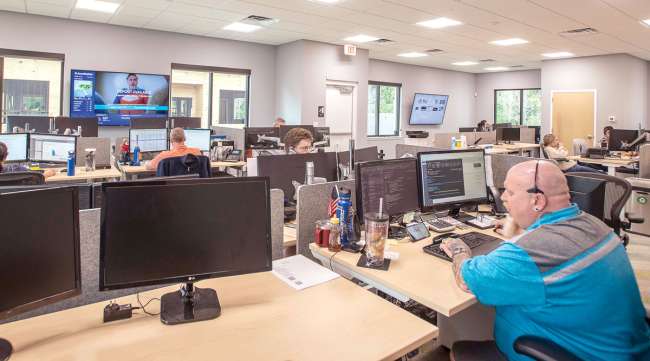
[Stay on top of transportation news: Get TTNews in your inbox.]
The third-party logistics business is undergoing a dramatic, technology-driven transformation. The rise of digital freight matching, automated transactions and end-to-end shipment tracking is altering the way that 3PLs interact with their shipper customers and motor carriers alike.
Although demand for logistics services likely will increase in the decade ahead, freight brokers and 3PLs will need to adapt and evolve to remain relevant in this rapidly changing industry.
Looking toward the future, industry executives and observers generally envision a market that will be led by growing, tech-enabled 3PLs operating connected freight networks that increasingly automate the flow of transactions.
Most believe there will always be a place for small freight brokers with specialized knowledge and expertise, but overall, the adoption of technology and automation of business processes likely will define the road ahead for this segment of the transportation industry.

Harik
“We see a world where you have a lot of automation, you have a lot of visibility, you have a lot of efficiency through data — where you have a shortening of fulfillment cycles, where you have more nimbleness and just more efficient supply chains across the board,” Mario Harik, chief information officer at XPO Logistics, told Transport Topics.
In recent years, many of the largest 3PLs in North America have sought to improve customer service and gain a market advantage through investment in technology.
XPO, a prominent example of this trend, has built its own proprietary software platforms from the ground up.
“From the onset, we looked at technology as being a key enabler because we could see that our customers were working with many companies that had antiquated technology,” Harik said.
Today, XPO employs more than 1,800 technology professionals and spends more than $550 million per year on technology development.
“We’re incredibly excited by where tech will take the industry over time,” Harik said.
XPO, based in Greenwich, Conn., ranks No. 1 on the Transport Topics Top 50 list of the largest third-party logistics providers in North America.

►XPO still No. 1, but for how long?
►Map: Where the Top 50 are
►Armstrong: A mixed bag in 2019
Sector Rankings
Freight Brokerage | Dedicated
Dry Storage Warehousing
Refrigerated Warehousing
Ocean Freight | Airfreight
Within the 3PL industry, freight brokerage is the segment that will experience the most disruption from emerging technologies, said Robert Hooper, CEO of Atlantic Logistics, a broker based in Jacksonville, Fla.
“I think there’s always going to be a place for us,” he said, but added that small brokers that continue to rely on “pounding the phones” may no longer be able to compete in five to 10 years.
“The old way of doing this, with faxes and phone calls — they’re going to be the dinosaur, and they’re going to be left behind,” Hooper said. “And you know, that’s a good thing. This way is better than the old way. It’s better for society, it’s better for the shipper, it’s better for the carrier. It’s just not good for the Luddite that’s stuck in their old ways and is not going to adapt to the new technologies and push our industry forward.”
He predicted that margins will compress as transportation becomes more efficient, but 3PLs also will be able to handle more volume because they’ll be more productive.
At the same time, many 3PLs that have focused primarily on freight brokerage in the past may morph into more comprehensive service providers offering supply chain optimization, multimodal service, warehousing management and other value-added services.
“We need to diversify and get into these other market areas to be able to survive the changes that are coming to our industry,” Hooper said. “We’re trying to grow debt-free, but as quickly as possible to capitalize on those other market segments. That’s where I’m trying to position our company as CEO.”
Other industry experts also pointed to diversified service offerings and technology adoption as competitive advantages for 3PLs in the years ahead.

Kelley
“Shippers are going to gravitate towards 3PLs that provide expansive offerings — a full suite of products with advanced solutions and a history of excellent performance,” said Geoff Kelley, who recently joined Nolan Transportation Group as the company’s president.
In his new role, Kelley is guiding the Atlanta-based company’s efforts to expand nationwide as a multimodal broker through organic growth and mergers and acquisitions.
Kelley, who previously was chief operating officer at UPS Inc. subsidiary Coyote Logistics, also highlighted the importance of technology adoption.
In the years ahead, technology will enable 3PLs to provide more complex services that boost efficiency and improve speed and cost within supply chains, he said. “We aim to invest in technology significantly to leverage the scale of our growing network and the data it provides to drive efficiencies and eliminate waste.”
But technology is not the solution to all challenges. Investing in employees will remain important as well.
“The combination of talented people and cutting-edge technology will differentiate the best 3PL providers of the future, who will be able to do more and provide higher quality solutions for their customers that technology by itself cannot,” Kelley said.
While large 3PLs will benefit from their scale and density, Kelley said he expects the 3PL market to remain “highly fragmented.” At the same time, the 3PL segment is poised to capture a bigger slice of the overall transportation business, he predicted.
Robert Voltmann, president of the Transportation Intermediaries Association, also said the 3PL industry is poised for significant growth in the decade ahead.
TIA predicts that 3PLs will be making 50% or more of all freight purchasing decisions for shippers by 2030, which would be double the current level of outsourcing, he said.
In that same time frame, the association anticipates that the 3PL industry could expand from just under $300 billion per year to $600 billion, he added.

Voltmann
“We also see that there will thousands of competitors of all sizes able to run successful businesses,” Voltmann said. “But all of that is premised on them adopting new technology, reducing costs and, in some instances, changing the way they do business.”
One of those changes is the emergence of connected freight platforms — such as those established by C.H. Robinson Worldwide, J.B. Hunt and XPO — which are helping to streamline transactions while reducing the industry’s reliance on phone calls to find a truck.
“That truck finding has to be automated,” Voltmann said. “Using a truck once and throwing it back in the pond and casting out to catch another truck — that has to stop. It’s inefficient, it adds to risk, it adds expense.”
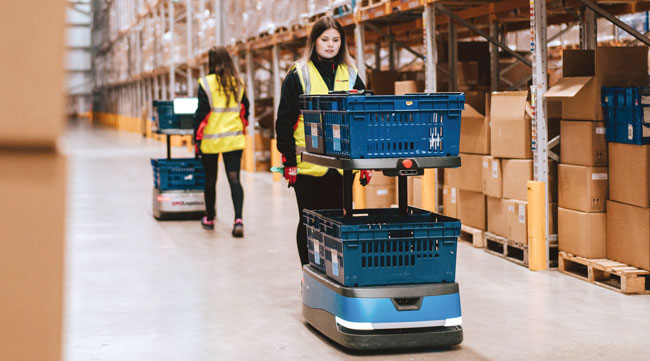
XPO has introduced "cobots" to assist warehouse workers. (XPO Logistics)
Technology taking hold in logistics
To boost profitability and meet shippers’ rising expectations, 3PLs have been deploying a range of technologies to streamline transportation and fulfillment.
XPO, for one, has been investing in data analytics, robotics and automated freight transactions.
In its warehouse operations, the company has deployed robotics to automate mundane and unsafe tasks, and fulfill orders more efficiently.
The company also is working to automate freight transactions through its XPO Connect freight marketplace. For example, when a carrier bids on a load, the system can use machine learning to automatically make a counteroffer based on market conditions without human feedback.
“You need a platform that allows shippers to transact electronically and allows carriers to transact electronically,” Harik said. “That’s where we think the world is going.”

Jindel
Industry analyst Satish Jindel, founder of SJ Consulting, predicted the biggest shippers likely will gravitate to large 3PLs in the years ahead.
Small and medium-size brokers, on the other hand, will have to survive through superior customer service and by building relationships with local shippers.
It also will be important for smaller brokers to diversify their services to handle more of their shippers’ needs, Jindel said. “If you are strictly a one-trick pony as a small guy, it’s going to be hard to keep your customers.”
Regarding his outlook for the 3PL industry as a whole, Jindel cited two main forces that are running counter to each other.
The ubiquity of the internet has put pressure on “middlemen” across many industries, including travel agents and stockbrokers, and that same trend also could have a negative impact on 3PLs.
At the same time, however, 3PLs stand to benefit from the increasing complexity of the transportation industry, which is raising the value of industry knowledge and expertise.
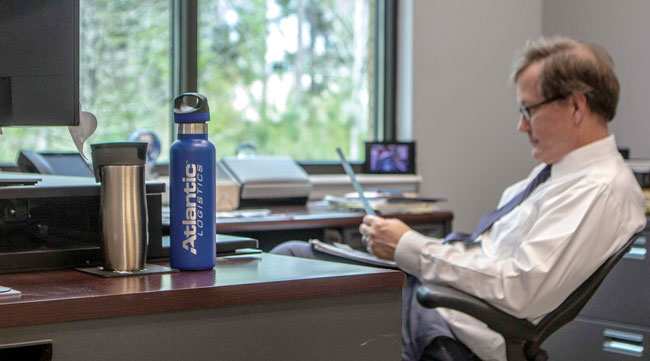
Atlantic Logistics CEO Robert Hooper. (James Crichlow/Atlantic Logistics)
How 3PLs can stay ahead of the curve
Unlike the industry’s largest 3PLs, small freight brokers typically don’t have the resources to develop their own proprietary technology platforms.
But that doesn’t mean they can’t improve their systems.
Hooper of Atlantic Logistics said smaller logistics firms must partner with technology vendors that can supply off-the-shelf software and keep up to date on the latest advances in technology on behalf of their 3PL customers. These technology partners can include developers of transportation management software, loadboard operators and providers of load-tracking and freight-matching systems.
Atlantic Logistics, for example, uses Trucker Tools’ Smart Capacity platform to match freight with trucks and automatically send offers to carriers.
“That’s not something I can do as a small business, but partnering with a technology partner, I can have access to this much vaster programming power behind the scenes,” Hooper said.
The company also is expanding its investment in its TMS from McLeod Software to automate processes such as billing while conducting checks for data integrity to eliminate errors.
Kingsgate Logistics, a freight broker based in Westchester, Ohio, is another 3PL that is investing in technology to prepare for the future.
The family-owned company realized it would need to evolve to remain a thriving business in the years ahead for its third generation of family leadership, said Tom Curee, Kingsgate’s vice president of strategic development.
The company is embracing the industry’s move toward digital freight matching and the use of artificial intelligence.
“We can’t be the traditional brokerage that we’ve always been and not play into this digital space,” Curee said on a recent episode of Transport Topics’ RoadSigns podcast.
Kingsgate is beginning to utilize forms of artificial intelligence and machine learning to improve efficiency and decision making.
Right now, the company is using AI primarily to improve carrier selection. Factors such as the shipment type and the time to cover that shipment based on previous experiences feed into an algorithm to determine the odds of a successful match.
Recruiting new employees is another emerging opportunity for AI to improve processes, Curee added.
To make this change possible, Kingsgate’s ownership is prioritizing technology investment.
“They are making a seven-figure investment in technology, which is like nothing we’ve ever done in the past,” Curee said. “So we’ve got the vision. And along with that, our customers and our prospects are jumping on for the ride. And as we’ve seen buy-in there, we’ve felt confident that we’re going down the right path.”
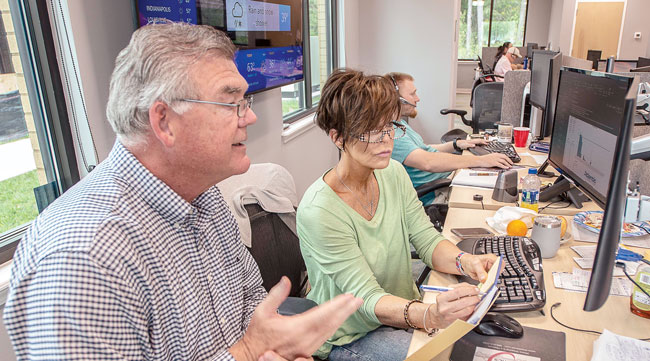
Atlantic Logistics Director of Operations Rex Oliver and Logistics Specialist Teresa Peterson discuss lanes and loads. (James Crichlow/Atlantic Logistics)
More consolidation on the horizon?
Mergers and acquisitions have altered the landscape of the 3PL sector in recent years, and that trend likely will continue in the years ahead, industry executives said.
XPO’s growth through acquisition has been the most prominent example of consolidation in the 3PL business, but the company announced in January that it was exploring the potential sale or spinoff of business units to boost value for shareholders. However, XPO ended that review process in March as the COVID-19 pandemic sent the stock market into a tailspin.
Regardless of the pace of industry consolidation, executives continue to see a role for logistics firms of all sizes.
XPO’s Harik predicted that the 3PLs that invest in technology will expand their market share over time, but there will still be a place for smaller brokers that offer specialized service for specific markets.
“I think there is always a place for niche type brokers. If you have a certain expertise in a given lane or a given service or a type of service that you’re using, there will always be a need for that,” he said. “But if you want to build scale and you want to build a large, sustainable business, technology is the answer.”
Hooper of Atlantic Logistics also sees consolidation as a major force that will shape the future of the 3PL industry.
By adding new capabilities through mergers and acquisitions, 3PLs will position themselves to go beyond traditional freight brokerage and offer more comprehensive freight management across multiple modes of transportation.
“That’s where we as a 3PL can bring value that a small shipper or a single shipper can’t have [on their own],” Hooper said.
TIA’s Voltmann believes 3PLs of all sizes will continue to thrive as the freight market grows, even if margins continue to decline.
“We don’t see mass consolidation of the industry. We see the big continuing to get big, but we see plenty of room for the midsize and small guys,” he said.
However, that outlook hinges on the continued health of small trucking companies, including owner-operators and fleets running 50 or fewer trucks, Voltmann said. “We need them to continue to survive and thrive.”
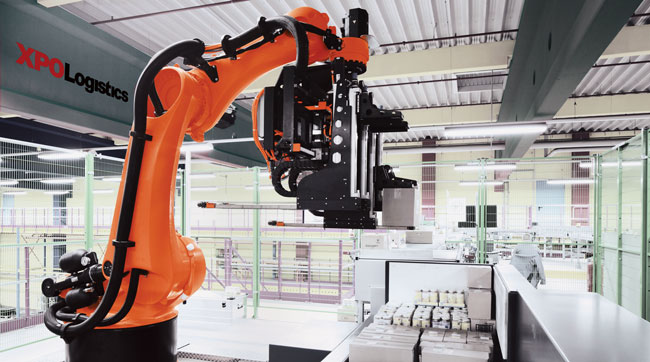
XPO is using warehouse robotics to shorten fulfillment cycles and automate simple tasks. (Andreas Hackl/XPO Logistics)
New ways of doing business
While some large 3PLs have been growing through acquisition, new players have been joining the logistics sector at the same time.
Technology-enabled newcomers such as Convoy, Uber Freight and Transfix have entered the industry with a focus on digital brokerage and automating freight transactions.
Lily Shen, president of Transfix, said 3PLs must be able to adapt to survive in the future.

Shen
“The players that are going to stay afloat are the ones that continue to evolve,” she said. “I think the opportunity is still huge, but people need to continue to evolve and augment the ways in which they work.”
At Transfix, automating business processes is a core part of that evolution, but the company is developing its technology to support rather than replace human workers.
“It’s not about technology completely disrupting and eradicating all existing processes,” Shen said. “It’s about how it continues to incrementally improve and really make it easier for people to do their jobs.”
Meanwhile, shippers are going to expect their 3PL partners to provide more value and services, including business insights, data analytics, freight visibility and seamless system integrations, she said.
“I believe that 3PLs are going to continue doing more. I just think that how they work will change,” Shen said. “And I also think the value that they bring is also going to change.”
As automation helps drive efficiency in third-party logistics, people will continue to play an essential role in freight brokerage, TIA’s Voltmann said.
As an example, he pointed to Uber Freight, which is using technology to simplify the load-matching process but at the same time plans to hire 2,000 employees to support its operations at its Chicago headquarters.
In the years ahead, the technology-driven transformation of the 3PL market will bring both challenges and opportunities for the thousands of companies competing in this segment of the transportation industry.
“For me, it’s a very exciting time to be alive,” said Hooper of Atlantic Logistics. “It’s a very exciting time to be in logistics, and to see what’s going to happen over the next decade, because I think it’s going to be a wild ride — and a great ride. All of these improvements we’re talking about make society better.”
Want more news? Listen to today's daily briefing:

